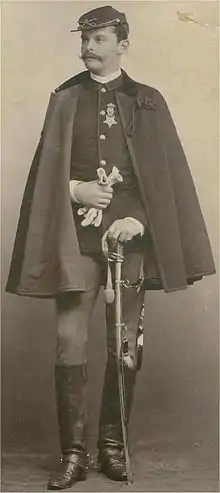Powhatan Henry Clarke
Powhatan Henry Clarke (October 9, 1862 – July 21, 1893) was a United States Army first lieutenant who was a recipient of the Medal of Honor during the Geronimo Campaign in Sonora, Mexico. He received the medal for rescuing a wounded soldier on May 3, 1886.[1]
Powhatan Henry Clarke | |
|---|---|
 Powhatan Henry Clarke wearing his Medal of Honor | |
| Born | October 9, 1862 Alexandria, Louisiana |
| Died | July 21, 1893 (aged 30) Fort Custer, Montana |
| Place of burial | |
| Allegiance | United States of America |
| Service/ | United States Army |
| Years of service | 1884–1893 |
| Rank | First Lieutenant |
| Unit | 10th U.S. Cavalry 9th U.S. Cavalry |
| Battles/wars | Apache Wars |
| Awards | Medal of Honor |
Clarke was the subject of art by Frederic Remington - "Lieutenant Powhatan H Clarke Tenth Cavalry" and "Soldiering in the Southwest–The Rescue of Corporal Scott".
Clarke's granddaughter, Bayard Wootten of New Bern North Carolina, was a photographer. Clarke's sister was a writer.
Life
Clarke was born at Ulster Plantation, Boyce, Louisiana on October 9, 1862. He was the grandson of U.S. federal judge Henry Boyce and Irene Archinard, and the son of Louise Frances Boyce and Dr. (Professor) Powhatan Clarke.[2][3] He partly studied in France. He graduated from the United States Military Academy in 1884.[4]
Clarke was a second lieutenant in the 10th Cavalry Regiment of the Buffalo Soldiers at Fort Davis, Texas.[4][5] On May 3, 1886, he rescued one of his wounded soldiers, Corporal Edward Scott, who was under heavy fire from Apaches at Pinito Mountains, Sonora. He received a Medal of Honor for this action.
He was the commander of Apache Scouts until 1891. That same year, he became a compatriot of the District of Columbia Society of the Sons of the American Revolution and was assigned national membership number 1976.
In 1891, he became First Lieutenant and he was transferred to the 9th Cavalry Regiment. From 1891 to 1892 he was an observer, stationed at Düsseldorf, Germany with a Westphalian Hussar regiment. The discipline of the German Army greatly impressed him.[6]
He was back with the 10th Cavalry by early 1892. From 1892 until his death in 1893, he lived in Fort Custer, Montana. In 1892 he married Elizabeth Clemens of St. Louis, Missouri; they had one son. After diving into shallow water and striking his head, Clarke drowned in the Little Bighorn River on July 21, 1893,[7] and was buried at Calvary Cemetery in St. Louis, Missouri.[5]
Medal of Honor citation
Rank and organization: Second Lieutenant, 10th U.S. Cavalry. Place and date: At Pinito Mountains, Sonora, Mex., May 3, 1886. Entered service at: Baltimore, Md. Birth: Alexandria, La. Date of issue: March 12, 1891.[1]
Citation:
Rushed forward to the rescue of a soldier who was severely wounded and lay, disabled, exposed to the enemy's fire, and carried him to a place of safety.
References
 This article incorporates public domain material from websites or documents of the United States Army Center of Military History.
This article incorporates public domain material from websites or documents of the United States Army Center of Military History.
- "Medal of Honor recipients Indian Wars Period". Army Center of Military History. Archived from the original on May 24, 2009. Retrieved April 12, 2009.
- "Lieut. Powhatan Clarke Drowned" (PDF). The New York Times. July 22, 1893. Retrieved April 13, 2009.
- "Powhatan Henry Clarke". Genealogy.com. The Generations Network. Archived from the original on June 6, 2011. Retrieved April 13, 2009.
- Thapp (1991), p. 80
- "Lieutenant Powhattan H. Clarke". Buffalo Soldiers El Paso. Archived from the original on February 9, 2010. Retrieved April 13, 2009.
- "German Army Discipline" (PDF). The New York Times. May 17, 1892. Retrieved April 13, 2009.
- "Lieut. Clarke's Death". Evening Star. July 26, 1893. Retrieved July 13, 2021.
Photo courtesy of the Helen and Alfred Wettermark Collection
Bibliography
- Thrapp, Dan L. (1991). Encyclopedia of Frontier Biography: A–F. Lincoln, NE: University of Nebraska Press. ISBN 0-8032-9418-2.
External links
- "Powhatan Henry Clarke". Claim to Fame: Medal of Honor recipients. Find a Grave. Retrieved June 21, 2009.